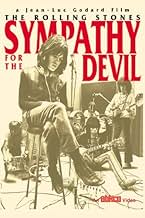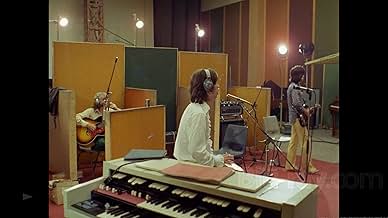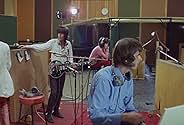IMDb-BEWERTUNG
6,2/10
3442
IHRE BEWERTUNG
Füge eine Handlung in deiner Sprache hinzuWhile The Rolling Stones rehearse "Sympathy for the Devil" in the studio, Godard reflects on 1968 society, politics and culture through five different vignettes.While The Rolling Stones rehearse "Sympathy for the Devil" in the studio, Godard reflects on 1968 society, politics and culture through five different vignettes.While The Rolling Stones rehearse "Sympathy for the Devil" in the studio, Godard reflects on 1968 society, politics and culture through five different vignettes.
- Regie
- Drehbuch
- Hauptbesetzung
Sean Lynch
- Commentary
- (Synchronisation)
Keith Richards
- Self - The Rolling Stones
- (as Keith Richard)
Frankie Dymon
- Black power militant
- (as Frankie Dymon Jnr.)
Tommy Ansah
- Black power militant
- (as Tommy Ansar)
Empfohlene Bewertungen
Jean Luc Goddard's 'Sympathy For The Devil',or as it's known better in Europe as 'One Plus One' is an enigma (of sorts). The film's European title seems to better sum it all up. When Goddard went to England in 1968, he originally wanted to direct a film with a pro abortion angle, at a time when abortion was illegal. As it turns out, before production could begin,abortion became legal in the U.K. Goddard, none the less, decided to hang out & make a film anyway. He ended up as a guest of the Rolling Stones,where he filmed several days of the Stones in the recording studio,working on the sessions for the song 'Sympathy For The Devil', this footage was augmented with Godard's take on revolutionary politics of the era. The results are a mixed bag that some folk will get, others not so. I attended a midnight screening of this film some years ago with a crowd that expected a Rolling Stones concert film, and didn't get it, got downright ugly (a pity,but predictable for those who lack any knowledge of Godard's fragmentary style of narrative). No rating,but contains rough language,brief nudity & verbal descriptions of some graphic sexual situations.
This film is for true Rolling Stones or Godard fans only. If you are neither of the above you will probably have trouble sitting through the whole movie. Godard's political ramble becomes tedious at times, but watching the development of the Stones' song is priceless. Seeing the song come together as a blistering whirlwind is reward enough for repressing the urge to fast-forward through the rest of the film.
Sympathy for the Devil (1968)
BOMB (out of 4)
Jean-Luc Godard's "documentary" shows The Rolling Stones recording the title track while mixing in footage of the Black Panthers preaching hatred. This is without question one of the worst documentaries I've ever seen and it's the worth Godard film I've seen to date but it's rather amazing how incredibly stupid this legendary director can be at times. The title is going to attract mainly fans of The Rolling Stones but their footage isn't here for fans and I'm still trying to think of why Godard put the footage here. Apparently he's director's cut run eleven minutes longer and features more of the Black Panthers and it's clear that he wanted the spotlight on hate instead of the band so why include the band at all? There's one scene where a couple Black Panthers tell a story of how they want to kill white women and Godard follows this up with a short film of black men gunning down white women. There's non-stop hatred talk coming from this group so I'm really shocked there's not more controversy surrounding this film. There are various short films throughout the movie and there's all sorts of stuff acted out, which makes no sense when put together and you also get constant scenes of men spray painting cars. The Stones footage shows them recording the classic song from the early stages to its complete version but with all the other crap in this film I can't even recommend this to fans of the group.
BOMB (out of 4)
Jean-Luc Godard's "documentary" shows The Rolling Stones recording the title track while mixing in footage of the Black Panthers preaching hatred. This is without question one of the worst documentaries I've ever seen and it's the worth Godard film I've seen to date but it's rather amazing how incredibly stupid this legendary director can be at times. The title is going to attract mainly fans of The Rolling Stones but their footage isn't here for fans and I'm still trying to think of why Godard put the footage here. Apparently he's director's cut run eleven minutes longer and features more of the Black Panthers and it's clear that he wanted the spotlight on hate instead of the band so why include the band at all? There's one scene where a couple Black Panthers tell a story of how they want to kill white women and Godard follows this up with a short film of black men gunning down white women. There's non-stop hatred talk coming from this group so I'm really shocked there's not more controversy surrounding this film. There are various short films throughout the movie and there's all sorts of stuff acted out, which makes no sense when put together and you also get constant scenes of men spray painting cars. The Stones footage shows them recording the classic song from the early stages to its complete version but with all the other crap in this film I can't even recommend this to fans of the group.
Sure, there are lots of reviews that concentrate on the sections that revolve around the African - Euopeans and Americans that interrupt the recroding session or the Rolling Stones' Sympathy for the Devil. But, this is just a small part of an amazing and beautiful record of a process that created a song that will last for generations.
Watching the rhythm section work out the song, Mick working out the lyrics, Keith conducting the whole thing, Brian Jones playing remarkable keyboards, reminds us of the process of production. It took time. It took failures and it became an amazing song.
Besides that, the film is so beautifully shot is looks like it came out of an 21st century design magazine.
And please don't ignore the digressions. It is (in my humble opinion) about the appropreation of black culture by whites and white culture by blacks. An interesting diversion when you think about 1968 and Europe and the Americas. We all switch and use and sometimes it makes beautiful music.
This is an important film that should be seen by anyone going into a studio to record a song that will be remebered forever.
Watching the rhythm section work out the song, Mick working out the lyrics, Keith conducting the whole thing, Brian Jones playing remarkable keyboards, reminds us of the process of production. It took time. It took failures and it became an amazing song.
Besides that, the film is so beautifully shot is looks like it came out of an 21st century design magazine.
And please don't ignore the digressions. It is (in my humble opinion) about the appropreation of black culture by whites and white culture by blacks. An interesting diversion when you think about 1968 and Europe and the Americas. We all switch and use and sometimes it makes beautiful music.
This is an important film that should be seen by anyone going into a studio to record a song that will be remebered forever.
- I Am Media Boy.
One of Nouvelle Vague iconoclast Jean-Luc Godard's most engaging oddities, part music documentary of the Rolling Stones rehearsing and recording "Sympathy for the Devil", part a collage of sketches on modern-day revolution and the struggle of the minorities for freedom, punctuated by a number of double-entendre title cards. Generally ranged alongside Godard's political work of the late sixties, it's in fact a cynical and very twisted meditation on the politics of minorities, since the director equates women's lib, communism, fascism and the Black Panthers' radicalism at the same level, all while the Stones find a way to tell the Devil's take on the history of civilization. Mostly, it's questioning what real impact can theoretical concepts of revolution have in a world where language obscures as much as it shares, as is acutely pointed out in the Black Panther's interview where, once asked how are they going to communicate their aspirations to the white man, the black revolutionary replies he has no idea since black men and white men don't really speak the same language. Is music, then, the universal language that everyone speaks? Godard says nothing. He prefers to film, in very long and beautifully executed tracking one-takes, either the Stones rehearsing in a candid manner, or the various revolutionaries spouting their ideals out loud, while a cynical voiceover reads excerpts of pulp novels with the names replaced by those of post-war politicians. It is, in fact, "one plus one": one half rock documentary of interest to Stones fans, one half political satire and commentary. The beauty lies in mixing them together, but I'll admit that only a hardcore Godard fan can enjoy and make sense of the combination.
Wusstest du schon
- WissenswertesThe producer of the film added film of The Rolling Stones performing the completed version of "Sympathy for the Devil" at the end of the movie in an attempt to make it more commercial. Jean-Luc Godard was so incensed by this that he punched the producer during a talk at London's National Film Theatre.
- Alternative VersionenJean-Luc Godard's original director's cut (titled "One Plus One") runs approximately 110 minutes and consists largely of additional footage of the black power militants. The film's producers were dissatisfied with this cut and deleted 11 minutes, changed the title to "Sympathy for the Devil" to underscore the Stones connection, and added the final version of the title song to the film's soundtrack, over a freeze-frame of the last shot. These changes were all made without Godard's knowledge; when he finally saw them at the film's London Film Festival premiere, he allgedly went berserk and physically attacked one of the producers.
- VerbindungenEdited into Geschichte(n) des Kinos: Une vague nouvelle (1999)
Top-Auswahl
Melde dich zum Bewerten an und greife auf die Watchlist für personalisierte Empfehlungen zu.
Details
- Erscheinungsdatum
- Herkunftsländer
- Offizieller Standort
- Sprache
- Auch bekannt als
- The Rolling Stones - Sympathy for the Devil
- Drehorte
- Battersea Railway Bridge, Battersea, London, England, Vereinigtes Königreich(car wreck by the Thames)
- Produktionsfirmen
- Weitere beteiligte Unternehmen bei IMDbPro anzeigen
Box Office
- Budget
- 1.000.000 $ (geschätzt)
Zu dieser Seite beitragen
Bearbeitung vorschlagen oder fehlenden Inhalt hinzufügen





























